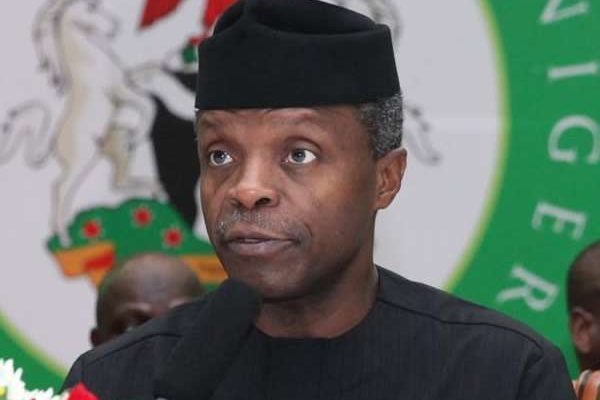Why FG’s Efforts On Poverty Alleviation Not Yielding Expected Results- Osinbajo
Vice President Yemi Osinbajo Friday said that several efforts made by governments for poverty alleviation have not yielded the required results because of emphasis on documentation and paperwork.
The Vice President said the issue of poverty alleviation should be approached with common sense in order to resolve all the issues and focus on real progress.
Prof. Osinbajo stated this at the inaugural meeting of the National Poverty Reduction with Growth Strategy Steering Committee held at the Presidential Villa, Abuja.
He said the President Muhammadu Buhari-led administration plans to lift 100 million Nigerians out of poverty in ten years will not be based on a business as a usual approach but through a very simple, common-sense strategy that will deliver the results as he (Buhari) promised.
The Vice president in a statement issued by his spokesman, Laolu Akande said,” in order not to make this merely, another of those high-sounding committees that eventually achieve nothing, we have to be very intentional about our objectives and how to achieve them.”
Addressing members of the committee, Prof. Osinbajo said the government would adopt a different and more effective approach in actualizing the objective of eradicating poverty in the country for the sake of delivering results.
According to him, “I really want us to approach this as much as possible, commonsensical so that we are able to resolve all the issues and focus on the real progress.
“I want us to look beyond all of what we are going to be doing, there is going to be a considerable amount of paperwork, but a lot of common sense is what grows economies. It’s what other countries have done, not really reinventing the wheel. So, I want us to focus on those commonsensical things so that we can actually move forward.”
Citing the example of Bangladesh where a poverty reduction strategy was also implemented, the VP noted how the country’s manufacturing sector was key.
“Bangladesh actually exports more garments than we export oil,” the VP said.
He said, “countries that have managed to get out of poverty have created a lot of jobs through industries, and they have developed intentional strategies.
“We must look at what others have done, the smart things that other people have done, and adopt.”
He also spoke about agriculture. “We really have to think smartly about how we are funding agriculture,” he said.
“I think we really need to take a deep dive because governments have made several efforts at poverty alleviation but generally speaking, they have not yielded the sort of results they should yield, and I think it’s because there is a lot of focus on documentation and paperwork and very little commonsense approaches,” the VP added.
Prof. Osinbajo explained that the National Poverty Reduction with Growth Strategy is meant to be a national strategy, not just a federal effort and it is aimed at taking 100 million people, nationally, out of poverty within a target time-frame of 10 years.
His words: “I just want to emphasize that it is a national strategy as opposed to a federal strategy which is why the steering committee is made up of federal as well as state officials.”
While also emphasizing the role of the private sector, the VP said “essentially, this effort must also be directed at how to facilitate private sector creation of jobs. The fact is that there is no way that the Federal Government or the State Governments can create the number of jobs that we need.
“We need to take a few broad looks at the features of what constitutes our present predicaments in terms of job losses and unemployment.”




